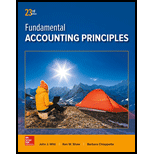
Concept Introduction: Business can be of various types but broadly they are categorized in two types. The one who undertake sale the goods are knows as manufacturing or trading businesses and the one who provide the services are known as service industry.
To identify: The items that will appear in the financial statements of merchandising company but not in the statements of service companies.
Explanation of Solution
The businesses can be different so as to their components of financial statements. The businesses can be of three different kinds. These are manufacturing, trading and the service industry.
Manufacturing industry is the business which is engaged in the production of goods. Trading industry is engaged in the selling of products already manufactured by someone and service industry is that business which is involved in providing services on the basis of their knowledge and know-how.
The following are the items that will appear in the financial statements of merchandising companies but not in the statements of service companies:
a) Cost of goods sold – Cost of goods sold is reported in the income statement of merchandising company. Since no goods are involved in the service industries, it will not be there in their income statement.
b) Purchase cost of material - Since no goods are involved in service industries. Hence, it will not be there in the income statement of service industry.
c) Changes in inventories - Since no goods are involved in service industries. Hence, it will not be there in the income statement of service industry.
d) Inventory – Value of inventory in hand is reported in the
Want to see more full solutions like this?
Chapter 5 Solutions
Fundamental Accounting Principles
- Solvearrow_forwardA local bakery sells 12,000 loaves of sourdough bread each year. The loaves are ordered from an outside supplier, and it takes 4 days for each shipment of loaves to arrive. Ordering costs are estimated at $18 per order. Carrying costs are $6 per loaf per year. Assume that the bakery is open 300 days a year. What is the maximum inventory of loaves held in a given ordering cycle? Solutionarrow_forwardHello tutorarrow_forward
- A local bakery sells 12,000 loaves of sourdough bread each year. The loaves are ordered from an outside supplier, and it takes 4 days for each shipment of loaves to arrive. Ordering costs are estimated at $18 per order. Carrying costs are $6 per loaf per year. Assume that the bakery is open 300 days a year. What is the maximum inventory of loaves held in a given ordering cycle?arrow_forwardGiven solution for General accounting question not use aiarrow_forwardPlease provide correct solution and accounting questionarrow_forward
- Answer? ? Financial accounting questionarrow_forwardWhat is the maximum inventory of places held in a given ordering cyclearrow_forwardA local bakery sells 12,000 loaves of sourdough bread each year. The loaves are ordered from an outside supplier, and it takes 4 days for each shipment of loaves to arrive. Ordering costs are estimated at $18 per order. Carrying costs are $6 per loaf per year. Assume that the bakery is open 300 days a year. What is the maximum inventory of loaves held in a given ordering cycle? need your helparrow_forward
- What is the machine's book value at the end of 20X4?arrow_forwardAccounting solutionarrow_forwardA local bakery sells 12,000 loaves of sourdough bread each year. The loaves are ordered from an outside supplier, and it takes 4 days for each shipment of loaves to arrive. Ordering costs are estimated at $18 per order. Carrying costs are $6 per loaf per year. Assume that the bakery is open 300 days a year. What is the maximum inventory of loaves held in a given ordering cycle?arrow_forward

 AccountingAccountingISBN:9781337272094Author:WARREN, Carl S., Reeve, James M., Duchac, Jonathan E.Publisher:Cengage Learning,
AccountingAccountingISBN:9781337272094Author:WARREN, Carl S., Reeve, James M., Duchac, Jonathan E.Publisher:Cengage Learning, Accounting Information SystemsAccountingISBN:9781337619202Author:Hall, James A.Publisher:Cengage Learning,
Accounting Information SystemsAccountingISBN:9781337619202Author:Hall, James A.Publisher:Cengage Learning, Horngren's Cost Accounting: A Managerial Emphasis...AccountingISBN:9780134475585Author:Srikant M. Datar, Madhav V. RajanPublisher:PEARSON
Horngren's Cost Accounting: A Managerial Emphasis...AccountingISBN:9780134475585Author:Srikant M. Datar, Madhav V. RajanPublisher:PEARSON Intermediate AccountingAccountingISBN:9781259722660Author:J. David Spiceland, Mark W. Nelson, Wayne M ThomasPublisher:McGraw-Hill Education
Intermediate AccountingAccountingISBN:9781259722660Author:J. David Spiceland, Mark W. Nelson, Wayne M ThomasPublisher:McGraw-Hill Education Financial and Managerial AccountingAccountingISBN:9781259726705Author:John J Wild, Ken W. Shaw, Barbara Chiappetta Fundamental Accounting PrinciplesPublisher:McGraw-Hill Education
Financial and Managerial AccountingAccountingISBN:9781259726705Author:John J Wild, Ken W. Shaw, Barbara Chiappetta Fundamental Accounting PrinciplesPublisher:McGraw-Hill Education





